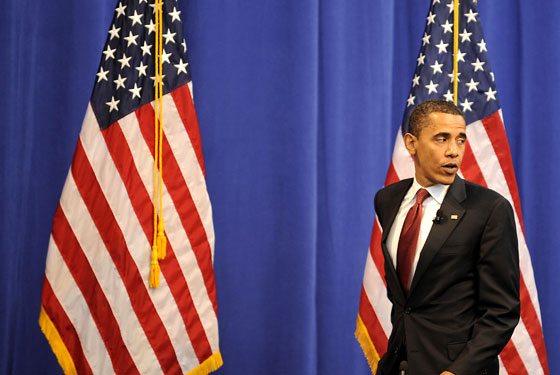
Photos: Getty Images
Last Thursday Barack Obama made what he thought was a fairly “innocuous” statement — that after visiting Iraq and talking to commanders there, he will “have more information and will continue to refine” his war policies. The line was about as innocuous, it turns out, as a swarm of killer bees: Responses to it were so critical that Obama hastily called a press conference to clarify himself. “I am not searching for maneuvering room,” he said, but what he learns in Iraq “will obviously inform how we shape our plans moving forward … But, you know, let me be as clear as I can be: I intend to end this war.” The punditocracy has yet to agree on whether his remarks are the latest sign of the supposedly epic Shift to the Center 2008, or whether it’s even a shift at all.
• Josh Marshall believes Obama “has been quite consistent on proposing a 16-month timetable for withdrawal from Iraq.” The reason John McCain’s campaign “spends what seems almost literally to be all its time … trying to find some movement or contradiction” in Obama’s rhetoric on Iraq is that “McCain’s position [on Iraq] is squarely on the wrong side of public opinion” and “wildly unpopular.” [TPM]
• Fred Barnes says that “any president” would “consult the generals before ordering troop withdrawals.” The only thing in Obama’s formulation that has changed “is that ‘stability’ would be a consideration,” but stability is “a vague concept” whose meaning is in the “eye of the beholder.” Obama’s problem will come after he actually visits Iraq and has to face the reality that the civil war is “over,” Al Qaeda is “largely beaten,” and the government is less sectarian and “dysfunctional.” [Blog/Weekly Standard]
• E.J. Dionne thinks that Obama “has not figured out how to slip the trap John McCain’s campaign is trying to set for him” — characterizing him as either impervious to change or a flip-flopper. McCain is “plainly adjusting his rhetoric to appease the clear majority of Americans who believe the Iraq war was a mistake and want it to end,” but Obama has more to lose because his “strongest argument for himself on foreign policy rests on his sound judgment in opposing the war from the beginning, [and] any appearance of waffling on the issue is especially dangerous.” [WP]
• Ezra Klein notes that among the people who follow Iraq closely (as opposed to people who follow the election closely), the only confusion is over how Obama’s position has supposedly changed. [American Prospect]
• Jennifer Rubin theorizes that Obama can’t make a “clean break” and come out for the surge because he’s afraid to face his base after running an anti-war primary campaign. But meanwhile, he has yet to say whether he thinks the war is winnable. Until he makes that point clear, his strategy of “having it both ways … is causing further erosion of his New Politics image.” [Contentions/Commentary]
• The New York Times editorial board writes that Obama “is now giving himself wiggle room by suggesting he will let military commanders set the pace,” but what’s needed by both candidates are answers to “how they plan to meet their commitments and also ensure that Iraq’s chaos does not spin further out of control or spread even further over its borders.” [NYT]
• Avi Zenilman says that in order to avoid the “lose-lose formulation” the Republicans are trying to force him into, Obama “has reemphasized his foreign policy that hinges on defeating Al Qaeda in Afghanistan and Pakistan.” [Politico]
• Dana Goldstein contends that Obama’s “statement that he’d assess conditions on the ground before implementing his promised Iraq troop draw down is just common sense.” [Tapped/American Prospect] —Dan Amira
For a complete and regularly updated guide to presidential candidates Barack Obama and John McCain — from First Love to Most Embarrassing Gaffe — read the 2008 Electopedia.





























